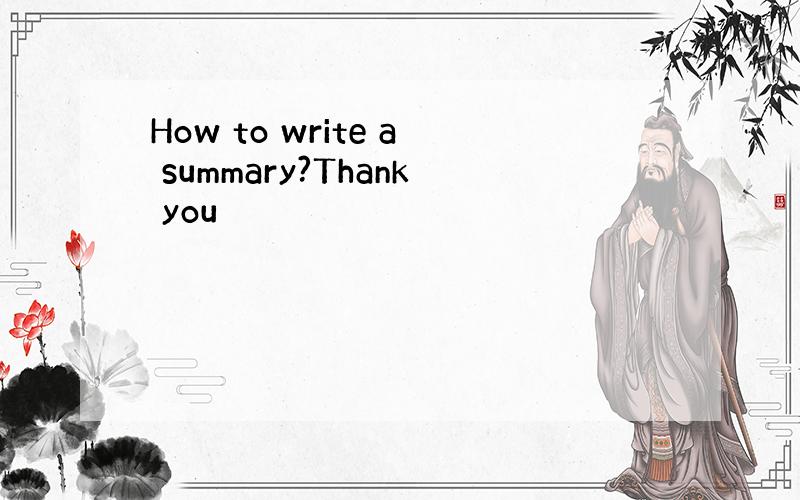How to write a summary?Thank you
来源:学生作业帮 编辑:神马作文网作业帮 分类:英语作业 时间:2024/11/11 07:39:03
How to write a summary?Thank you
I appreciate any tips you can tell.
I appreciate any tips you can tell.

How to write a summary?
Read the passage carefully. Determine its structure. Identify the author's purpose in writing. (This will help you to distinguish between more important and less important information.)
Reread, label, and underline. This time divide the passage into sections or stages of thought. The author's use of paragraphing will often be a useful guide. Label, on the passage itself, each section or stage of thought. Underline key ideas and terms.
Write one-sentence summaries, on a separate sheet of paper, of each stage of thought.
Write a thesis--a one-sentence summary of the entire passage. The thesis should express the central idea of the passage, as you have determined it from the preceding steps. You may find it useful to keep in mind the information contained in the lead sentence or paragraph of most newspaper stories--the what, who, why, where, when, and how of the matter. For persuasive passages, summarize in a sentence the author's conclusion. For descriptive passages, indicate the subject of the description and its key features. Note: In some cases a suitable thesis may already be in the original passage. If so, you may want to quote it directly in your summary.
Write the first draft of your summary by (1) combining the thesis with your list of one-sentence summaries or (2) combining the thesis with one-sentence summaries plus significant details from the passage. In either case, eliminate repetition. Eliminate less important information. Disregard minor details, or generalize them. Use as few words as possible to convey the main ideas.
Check your summary against the original passage, and make whatever adjustments are necessary for accuracy and completeness.
Revise your summary, inserting transitional words and phrases where necessary to ensure coherence. Check for style. Avoid series of short, choppy sentences. Combine sentences for a smooth, logical flow of ideas. Check for grammatical correctness, punctuation, and spelling.
Read the passage carefully. Determine its structure. Identify the author's purpose in writing. (This will help you to distinguish between more important and less important information.)
Reread, label, and underline. This time divide the passage into sections or stages of thought. The author's use of paragraphing will often be a useful guide. Label, on the passage itself, each section or stage of thought. Underline key ideas and terms.
Write one-sentence summaries, on a separate sheet of paper, of each stage of thought.
Write a thesis--a one-sentence summary of the entire passage. The thesis should express the central idea of the passage, as you have determined it from the preceding steps. You may find it useful to keep in mind the information contained in the lead sentence or paragraph of most newspaper stories--the what, who, why, where, when, and how of the matter. For persuasive passages, summarize in a sentence the author's conclusion. For descriptive passages, indicate the subject of the description and its key features. Note: In some cases a suitable thesis may already be in the original passage. If so, you may want to quote it directly in your summary.
Write the first draft of your summary by (1) combining the thesis with your list of one-sentence summaries or (2) combining the thesis with one-sentence summaries plus significant details from the passage. In either case, eliminate repetition. Eliminate less important information. Disregard minor details, or generalize them. Use as few words as possible to convey the main ideas.
Check your summary against the original passage, and make whatever adjustments are necessary for accuracy and completeness.
Revise your summary, inserting transitional words and phrases where necessary to ensure coherence. Check for style. Avoid series of short, choppy sentences. Combine sentences for a smooth, logical flow of ideas. Check for grammatical correctness, punctuation, and spelling.
How to write a summary?Thank you
31.Can you tell me how to write a thank-you n_________?
Does anybody know how to write a summary in English?Especial
Can you tell me how to write a thank-you n___?可一填什么呢?知道的都回答.
write a thank-you letter according to the information given
write a thank-you letter
Thank you for _________ me a letter.A.write B.to write C.is
How to study chinese?give me advice.Thank you for your write
Thank you for ( )your letter. A.write B.writingC.to write D.
Thank you for __ ( write )to me.
翻译:Write a thank-you note
How to write a outline?